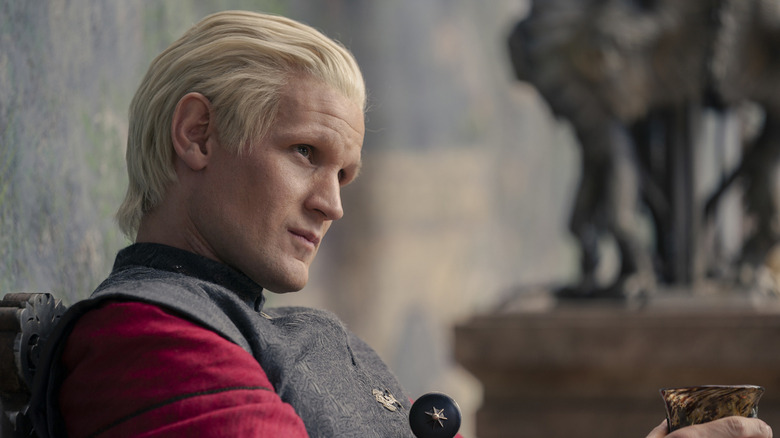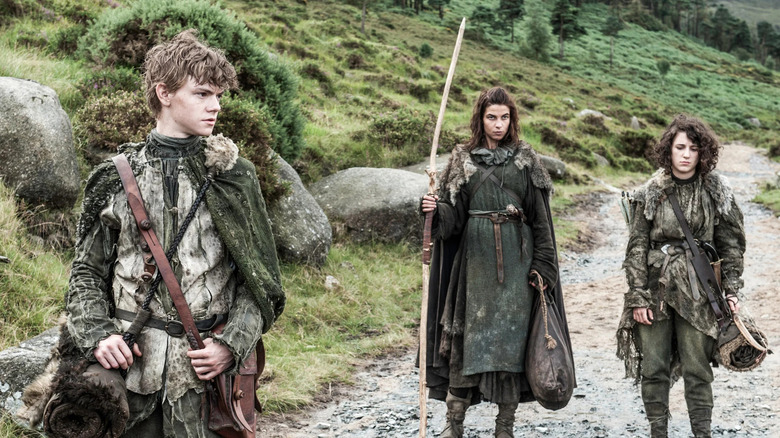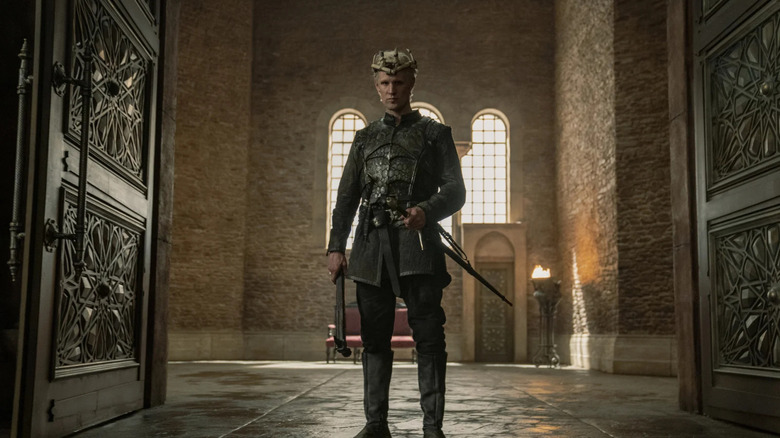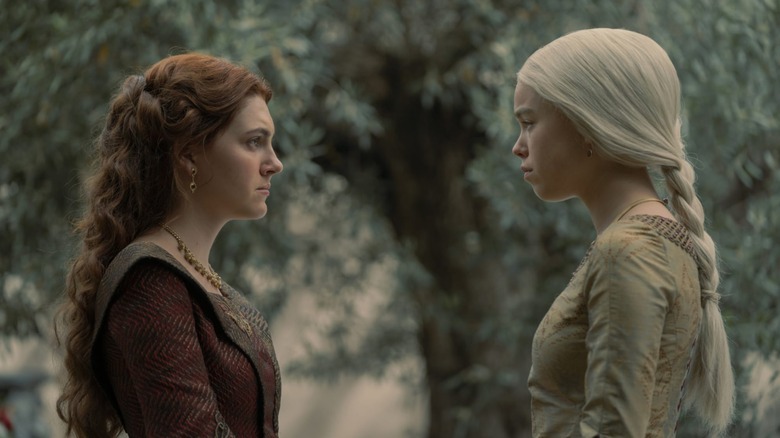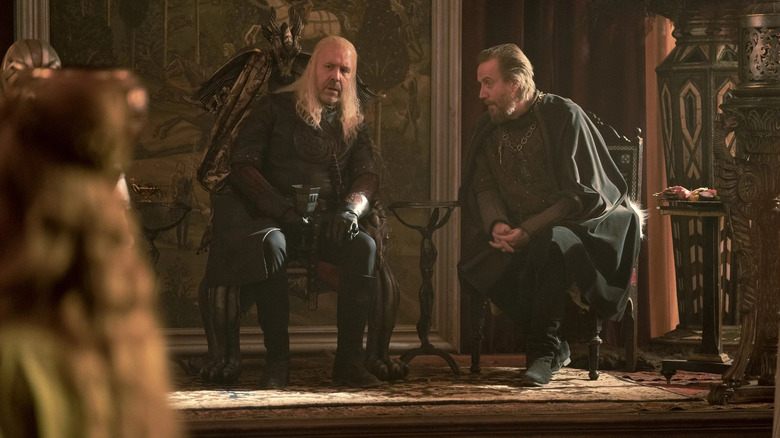The One Major Advantage House Of The Dragon Has Over Game Of Thrones
This post contains spoilers for episode four of "House of the Dragon."
One thing "Game of Thrones" deserves more credit (or blame) for is how much it normalized the idea of TV seasons being 10 to 13-hour movies. The show was a massive, sprawling epic with multiple storylines going on at the Wall, King's Landing, Winterfell, Essos, and usually a bunch of other places in-between. This meant that it was rare for any specific episode of "Game of Thrones" to stand on its own.
A typical episode from season 2 through 6 would check in with one character in one location, move on to another character in another place, and so on until the episode ended. There were some rules and patterns viewers learned to pick up on: if a character had an early scene in the episode, odds were they'd at least get to pop back in by the end of it as well. But if a character made their first appearance halfway through, you'd basically have to accept that this was the most you'd get from them that week.
This is why "House of the Dragon" has been so refreshing so far. This week's episode takes place almost entirely within King's Landing, zeroing in on a small handful of characters as they try to make sense of their current place in life. The only time "Game of Thrones" would ever spend this long in a single location is if there was a big battle going on, but "King of the Narrow Sea" takes place in a period of peace. As a result, it's an episode that's both familiar and exhilaratingly unlike anything we've ever seen in the original show.
The problems with Game of Thrones' approach
It's not that the format of "Game of Thrones" was bad, exactly. It helped to create a strong sense of narrative momentum, as every one of a given season's many storylines slowly heat up over the first half, and by the season's end viewers would be treated to one climactic event after another. It was also just straight-up impressive how many threads the show was able to juggle at once without ever falling apart.
But it also led to a sense of disconnection with all the characters. The writers didn't have much time to spend with everyone beyond merely covering each plot point from the books, which meant that most of the characters' complexity from George R.R. Martin's writing was stripped away. As acclaimed as the early seasons of "Thrones" were, you can definitely see the strain the show was under to properly adapt the source material. The show would often check in on a particular character, dutifully get them from point A to point B, and then check out. It was all they had time to do.
"House of the Dragon," meanwhile, has a lot fewer restrictions to work with. The show's based off source material that's nowhere near as popular as the main series, and nowhere near as long. "Thrones" would regularly have to squeeze countless pages of beloved source material into single episodes, whereas the multiple planned seasons of "House of the Dragon" are centered around a 250-page section of "Fire and Blood." Whereas "Thrones" struggled over what to cut from the books, the prequel showrunners have every opportunity to not just cover the book but to expand on it, to make the story their own while still being faithful.
Why King of the Narrow Sea was so good
The prequel's latest episode is a messy, emotional dive into Rhaenyra's attempts to deal with the many, many expectations placed upon her. We first see her touching the necklace her uncle Daemon (Matt Smith) gave her back in the first episode as she's in the middle of rejecting a bunch of potential suitors. She returns to King's Landing in time to see her father make peace with her Daemon, a resolution that clearly won't last.
Despite their previous conflicts, Rhaenyra and Daemon have always seemed to have a special understanding of each other. Here, we get to see the two sneaking out of the castle after dark and enjoying a taste of what life is like for everyday citizens. Not only that, but we get to see Rhaenyra happy and excited to be where she is for seemingly one of the few times in the series so far.
And then she and Daemon start hooking up in a brothel. In any other show, this would be a deeply disturbing scene, but for us unfortunate "Thrones" fans, its not even close to the most grossly incestuous thing we've had to witness. Their scene in the brothel is passionate and full of life, a direct contrast to the depressing sex scene between Viserys (Paddy Considine) and Alicent (Emily Carey). What Viserys and Alicent are doing is considered proper and healthy in this society, and yet everything about it just seems sort of sad. As weird and uncomfortable as Rhaenyra's scene with Daemon is, at least she's an enthusiastic, active participant. But unfortunately for Rhaenyra, there's no such thing as a fun night out for someone like her.
Rhaenyra's precarious position
The next day, Otto Hightower (Rhys Ifans) gives Rhaenyra's father the news of what had happened. In "Game of Thrones," it's easy to imagine this scene playing out like a cliffhanger, but "King of the Narrow Sea" wastes no time in letting the whole scenario unfold. Viserys gets one of his best moments where he (mostly) defends his daughter, Daemon gets unofficially banished back to the Vale, and Alicent and Rhaenyra have one of their best scenes together yet.
It's there where the many parallels the show's made between the two young women come to a head: Alicent's painfully formal marriage with Viserys may not be fun or fulfilling like Rhaenyra's hookup with Ser Cole was, but at least she's safe. Alicent's not forced to lie to her own friends and family just to avoid losing everything she wants. Both characters are coping with the same terrible system in two very different ways, and as Viserys fires Alicent's father at the end of this episode, it's not clear at all which direction is better.
The question of fulfilling duty versus desire, or the exploration of how women struggle to navigate their extremely limited options in this world, was always a major theme in "Game of Thrones," but rarely did we ever get to see it explored with this much depth. After all, the original show had plenty of other ground it needed to cover.
Thank the gods for a smaller cast
The difference in approach is particularly noticeable when you look back at the total screen-time each character got in "Game of Thrones." As much as Tyrion seemed to dominate season 2 for instance, he was only on screen for 64 minutes. Every other character got less than that. Fan favorite characters like Arya, Jon, and Daenerys were all treated to what would be just one or two episode's worth of focus in a regularly-plotted show, but stretched out through the whole season.
It made things particularly frustrating if you were a fan who didn't connect with certain characters. By season 3 there was a running joke in the fandom about fast-forwarding through Bran's scenes, and there were plenty of complaints about how frustrating it was to go from something like Jon's compelling Wall storyline to a scene where Theon gets tortured yet again. But "House of the Dragon" rarely leaves you wishing the show could just cut to another character, because there's really only one main storyline we're following.
It's only been four episodes into "House of the Dragon," but it already feels like we've known most of the characters for much longer. After all, if this show were more like "Game of Thrones," the plot of these four episodes would've been stretched out into a whole season.
It might've been initially disappointing to "Thrones" fans that the prequel series doesn't follow a massive cast of characters belonging to dozens of different houses, but in place of that, "House of the Dragon" may have given us something even more compelling. The prequel's structure is much closer to that of a standard TV show, and that might honestly be for the best.
